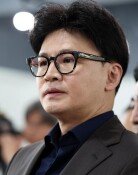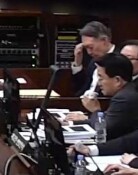Pres. Yoon pushes ahead with appointments of ministers
Pres. Yoon pushes ahead with appointments of ministers
Posted May. 18, 2022 10:50,
Updated May. 18, 2022 10:50
South Korean President Yoon Suk-yeol appointed Han Dong-hoon as the Minister of Justice and Kim Hyun-sook as the Minister of Gender Equality and Family on Monday. While President Yoon emphasized bipartisan cooperation from the opposition party during his administrative policy speech at the National Assembly on Sunday, he appointed two ministers who were deemed unqualified by the opposition party. This is the fifth time that President Yoon pushed ahead with the appointment despite the opposition party’s veto during the process of forming the Cabinet. It is also unfortunate that the newly appointed and the past three Ministers of Justice – Cho Kuk, Choo Mi-ae, and Park Beom-kye – faced objections from the opposition party.
The appointment of Han as the Minister of Justice signals going back from the Moon Jae-in administration’s stance to make the Ministry of Justice independent from the prosecution. The Vice-minister of Justice, which has been usually taken by someone with a background as a judge or lawyer, is not taken by a former prosecutor. This is the first time in five years since the Park Geun-hye administration that former prosecutors are appointed as both the Minister and Vice-minister of Justice. Five out of six secretaries for the presidential office's nomination recommendation, personnel verification, public office discipline, and general affairs are either former prosecutors or prosecution investigation officers, with three more prosecution investigation officers working in the secretary office assisting the president and the first lady. The office of legal secretary, which replaces the Office of Senior Secretary for Civil Affairs at Cheong Wa Dae, is the largest among the presidential office's divisions, except for the Presidential Security Service. Former prosecutors were appointed for the minister and vice-minister-level positions. This is why some call it the 'Republic of Prosecutors.'
President Yoon explained that the appointment of Han was intended as “taking away a sword and giving a pen.” The Minister of Justice does not directly instruct the prosecution’s investigations but can control them with the authorities over the personal affairs and inspections of the prosecution. The minister can decide whom to investigate with his standing special investigation authorities, as well as which prosecutors will be deployed to special investigations. Minister Han compared the past administration’s demotion of him to a “mad lynching.” Under these circumstances, the prosecution’s investigations of the previous administration can look like revengeful investigations. As Minister Han was very close to President Yoon, the prosecution under the influence of Minister Han could easily face criticism regarding its political neutrality.
Governance requires concession from both parties but the basic prerequisite is the ruling party taking a step back first. Appointing ministers, which will face clear objections from the opposition, without pre-negotiations with the opposition party after his administrative policy speech is hard to understand. The Democratic Party of Korea is even considering the dismissal of Minister Han, saying that the president’s forceful appointment of Han broke the principle of governance first. The ruling party will have to be held accountable for a political deadlock over the approval of Han Duck-soo as Prime Minister.



![[단독]김경 “1억원 줄때, 강선우도 함께 있었다” 자수서](https://dimg.donga.com/c/138/175/90/1/wps/NEWS/IMAGE/2026/01/14/133148772.5.jpg)

![반찬통 착색 고민 끝…‘두부용기’ 버리지 말고 이렇게 쓰세요 [알쓸톡]](https://dimg.donga.com/c/138/175/90/1/wps/NEWS/IMAGE/2026/01/09/133126593.3.png)

